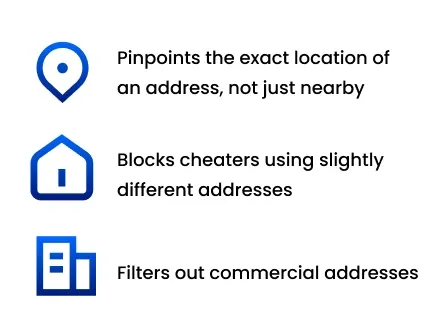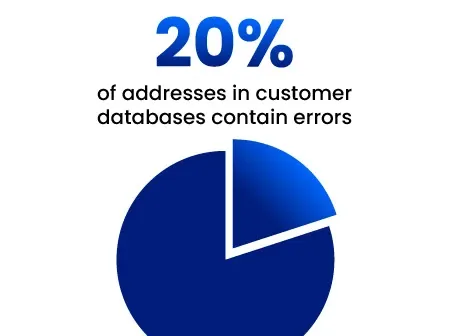Theme parks need address validation


When you think about theme parks, you probably think of roller coasters, long lines, and $18 turkey legs. But behind all the fun is a surprising need for something a little less flashy yet still gorgeous as all get out—rock-solid address validation (or address verification, we use them interchangeably). Yes, we’re talking about making sure that the addresses entered by guests are real, valid, and standardized.
Why? Because today’s theme parks operate like data-rich, customer-first ecosystems.
And nothing throws a wrench into a smooth system quite like a bad address.
Let’s examine some specific cases where behind-the-scenes address validation tools can help theme parks stay magical while maximizing efficiency and revenue.
1. Local discounts that actually stay local
Disneyland’s famous SoCal resident deals? They’re great… until someone in Montana tries to claim them with a phony California address. This may seem far-fetched, but this kind of thing happens all the time! Businesses lose millions every year to fake addresses and discount abuse. Theme parks, hotels, and even online stores offering special regional discounts constantly deal with people trying to bend the rules.
Rude.
To stop people from claiming discounts they shouldn’t, theme parks use real-time address validation and rooftop geocoding. This means they don’t just check if an address exists—they pinpoint its exact location down to the rooftop level, then georeference that location to ensure it falls within the parameters of the discount.
Why does this matter? Because people trying to cheat the system don’t always use completely fake addresses. Some might borrow a friend’s, enter a random SoCal ZIP Code, or even tweak an address slightly to make it look valid.

How it works: A theme park runs a special deal just for residents in 10 Southern California ZIP Codes. Here’s how rooftop geocoding and address validation keep things fair:
- Pinpoints the exact location of an address, making sure it’s inside the promo area, not just nearby
- Blocks cheaters using slightly altered addresses (like changing a street number or ZIP Code)
- Filters out commercial or forwarding addresses, so people can’t use P.O. boxes or third-party mail services to sneak in
Address validation makes sure offers meant for local ZIP Codes actually go to locals. With rooftop-accurate geocoding and postal verification, theme parks can confidently filter out addresses that don’t belong in the promo region.
2. Stopping duplicate entries for giveaways and contests
A free FastPass? Early park access? A backstage meet-and-greet with Captain Spacepants? Whatever your prize, someone will try to rig the system by entering multiple times with variations of their address.
This isn’t just a what-if—it happens all the time. Theme parks, online sweepstakes, and retailers running giveaways constantly deal with duplicate entries from the same person. In fact, fraud in promotions and loyalty programs costs businesses over $89 billion annually.
Some of the most common tricks include entering with minor address variations, like:
- "123 Main St Apt 4B"
- "123 Main Street #4B"
- "123 Main St. Unit 4B"
But, these are all the same place. Without address validation, these duplicate entries can slip through, unfairly increasing someone’s odds of winning while shutting out other participants.
With address verification, you get address standardization, so all the different variations of the same address are recognized as a single location.
That means:
- No more duplicate entries—all versions of “123 Main St” are treated as one
- A fairer experience for real participants
- Less administrative cleanup for contest organizers
Pro tip: Pair deduping with an address key or a persistent unique identifier (like SmartyKey®) so even future entries from the same household are flagged. SmartyKey tracks an address over time—even if street names or ZIP Codes change.
This means:
- Even future entries from the same household get flagged
- Address changes or reformatting won’t allow duplicate entries to sneak in
- Long-term tracking helps keep giveaways and loyalty programs fair
By using address verification, theme parks can stop giveaway fraud before it starts, keeping contests fair, fun, and frustration-free.
3. Mailing perks, merch, and magic without mishaps

Theme parks love to build loyalty with perks. Birthday postcards. Holiday freebies. Exclusive merch drops. It’s all part of building customer loyalty and keeping fans engaged.
But what happens when an address is a false positive (so it’s actually wrong), incomplete, or fake? That collectible magic wand meant for a die-hard fan? Poof! Lost in the postal void. And worse, the company is stuck paying for the failed delivery.
This isn’t just a small problem. Bad address data costs businesses billions every year. In fact, in 2023, four and a half billion pieces set mailers back $1,325,542,000.
With address validation, theme parks can:
- Typos get caught before they’re a problem.
- Missing unit numbers get flagged.
- Addresses are standardized to USPS specs (or international equivalents).
- Duplicate addresses don’t cost you money in marketing supplies. You only send one voucher, flier, announcement, etc. to one household, not five
Every failed mailing doesn’t just mean lost money on postage and printing—it means lost guest goodwill. When a fan doesn’t get their birthday freebie, they’re not blaming the post office… they’re blaming you. And that can lead to customer support calls, frustration, and even lost business.
With address validation, theme parks don’t just mail the magic—they make sure it actually arrives for fewer returned mailings, fewer customer support calls, happier guests, and more money in theme-park-inspired pants.
4. Smarter analytics and segmentation
Theme parks live and die by guest insights. Where are our most loyal passholders? Where should we open our next water park? Which region redeems the most coupons?
Every major business decision—marketing campaigns, park expansions, and guest experiences—relies on accurate data. If your address data is garbage, your analytics will be too. Clean, validated addresses unlock more accurate geospatial insights, demographic targeting, and customer segmentation.
When guest addresses are incomplete, outdated, or flat-out wrong, your reports are filled with misleading insights.
- Inflated visitor numbers from duplicate or fake addresses
- Poor geospatial insights because guests appear in the wrong locations
- Wasted marketing dollars targeting addresses that don’t exist
And it’s a widespread problem—up to 20% of addresses in customer databases contain errors, leading to inaccurate analytics and costly mistakes.

With real-time address validation, theme parks can:
- Standardize addresses, ensuring consistency across databases and minimizing duplicates, so one guest doesn’t appear as multiple people
- Pinpoint guest locations with geocoding, improving geospatial insights
- Get correct segmentation so marketing campaigns reach the right people
Hot tip: With Smarty’s US Address Verification, you get 55 metadata points like residential/commercial designation, helping you target home-based vs. business customers. You also get structure type, giving insights into single-family homes vs. apartment-dweller property details, and building size or lot data, all of which provide you with a better understanding of customers.
With clean, enriched address data, theme parks don’t just collect guest insights—they unlock a goldmine of strategic opportunities.
- Smarter marketing = Target the right guests with the right offers
- Better expansion decisions = Open new locations where your audience actually is
- More accurate reporting = Make data-driven decisions with confidence
5. Fraud prevention that works in real-time
Fake addresses can be a vector for bigger problems—like fraudulent chargebacks, abuse of promotions, and even bot-driven attacks during high-value ticket releases.
- Fraudulent chargebacks – Scammers use fake addresses to make purchases and dispute the charges, costing businesses billions annually.
- Ticket bot attacks – High-value ticket drops attract bots that flood systems with fake info to scalp passes or resell them at inflated prices.
- Promo abuse – Fraudsters use fake addresses to claim location-based discounts, free perks, or multiple contest entries.
Smarty’s address autocomplete and validation tools can stop bad entries at the point of submission. Theme parks encounter these issues frequently, especially when releasing exclusive deals, limited-edition merchandise, or high-demand event tickets.
By incorporating address verification into their processes, theme parks can stop bad data at the source by catching and preventing fake entries in real time and not “forcing” matches. (Some systems overmatch to nearby locations to return a result, even when the address doesn’t exist. Smarty doesn’t play that game.)
The result?
- Fewer fraudulent chargebacks – Because bad actors can’t fake their way in
- Less promo abuse – Discounts and perks go to real guests, not scammers or bots who will resell them
- Stronger security against bots – Address validation adds another layer of fraud prevention
Smarty helps theme parks keep their data clean, their promotions fair, and their ticketing secure—so the magic stays where it belongs.
The final ride
Theme parks are more than just thrill machines for spring break party people—they’re sophisticated, high-volume businesses that thrive on accurate data. Validating guest addresses is a must for protecting revenue, keeping experiences fair, and powering smarter decisions.
So whether you’re running a sprawling theme park empire or a single magical outpost, make sure your address data isn’t the weakest link in your guest experience chain.
Want to make sure your address data is as delightful as your park guests?
Check out Smarty’s address validation and autocomplete tools for the precision you need to keep the magic running.


